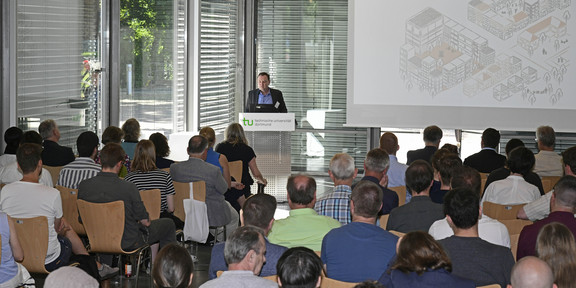Housing policy instruments for needs-based and affordable housing
- Kooperationen
- Wohnen und Stadt
- Wohnungspoltiik

As part of the event on "Housing policy instruments for needs-based and affordable housing", the topic was examined and analyzed from an academic, state policy, municipal and housing industry perspective. This multidimensional perspective was chosen deliberately, as housing policy instruments each offer different opportunities and challenges for individual players in the housing markets. As in previous years, experts from politics and administration, academia, the housing industry and numerous other institutions made their way to the Rudolf Chaudoire Pavilion at TU Dortmund University, and students also showed a keen interest in the topic.
The event was divided into two thematic blocks. The first two contributions provided a basic scientific background and the state government's perspective on the conference topic, while the following two contributions emphasized the practical perspective from a municipal and housing industry perspective using outstanding examples.
The speakers succeeded in bringing together the different perspectives on the topic in an excellent way, so that - as participants reported after the event - a thematically "very informative and highly topical event" took place. As expected, the complexity of the topic quickly became clear.
The general conditions on the housing markets have changed significantly since 2022. The demand for affordable housing has increased significantly once again due to inflation and the resulting rise in the cost of living as well as an increasing number of refugees, while at the same time the price sensitivity of buyers has increased. The turnaround in interest rates in particular has caused the supply of new-build apartments to collapse and demand is building up. In this context, the targeted and efficient use of housing policy instruments to ensure affordable housing that meets demand is becoming increasingly important. Despite the different interests of the stakeholders, constants also became apparent: firstly, municipal land (supply) policy, together with its supporting instruments such as municipal pre-emption rights or heritable building rights, is of fundamental importance. One of the most powerful housing policy instruments is the public housing subsidy from the state of North Rhine-Westphalia, which in many municipalities is supported by a quota system that is usually set out in housing action plans. It was also repeatedly emphasized that a coordinated municipal "overall view" of the available housing policy instruments is necessary to ensure that the instruments used achieve an optimal effect.
During the course of the colloquium, it became clear that housing policy instruments make a significant contribution to securing and stabilizing affordable housing that meets demand in municipalities and districts through their flexible adaptation, e.g. in the quota system, especially in times of increasing complexity on the housing markets. However, it also became clear that the task of creating and securing affordable housing cannot be solved comprehensively with them alone. The challenges at municipal level will remain great. For this reason, the NRW.BANK/TU Dortmund Housing Policy Colloquium will continue to address the issue of securing affordable housing and the role of housing policy instruments in the future and present the current status for discussion.




